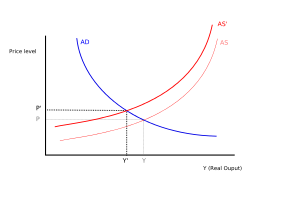Cost-push inflation

Cost-push inflation is an alleged type of inflation caused by substantial increases in the cost of important goods or services where no suitable alternative is available. A situation that has been often cited of this was the oil crisis of the 1970s, which some economists see as a major cause of the inflation experienced in the Western world in that decade. It is argued that this inflation resulted from increases in the cost of petroleum imposed by the member states of OPEC. Since petroleum is so important to industrialized economies, a large increase in its price can lead to the increase in the price of most products, raising the price level. Some economists argue that such a change in the price level can raise the inflation rate over longer periods, due to adaptive expectations and the price/wage spiral, so that a supply shock can have persistent effects.